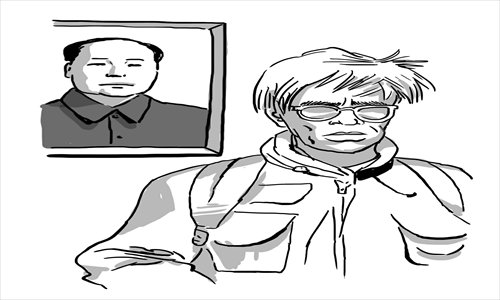Warhol’s Maos show respect, not mockery

Andy Warhol's name doesn't carry much weight in China. But this year, the Chinese public will be able to get a taste of the iconic pop artist's works in person.
The Andy Warhol Museum in Pittsburgh will bring more than 300 Warhol works to Shanghai and Beijing this year, including famous pictures such as Jackie, Marilyn Monroe, Self-Portrait and The Last Supper.
But unlike the planned exhibitions in other Asian cities, the five Mao portraits will be missing on the Chinese mainland because they stretch official acceptance too far.
This, from the Chinese point of view, is not hard to understand. Warhol's Maos, although adopted from the official "red book" of Mao's quotations, are provocatively colored. In some cases, it even looks like he is wearing makeup. This could easily be taken as disrespectful by the Chinese public, many of whom still have deep emotional ties to the Great Helmsman.
But in Warhol's case, being disrespectful might not have been the intention at all.
Warhol started to depict Mao in 1972 at a historic time when then US president Richard Nixon was visiting China. But he was not known as a political person. His choice was in line with his predilection for chasing power. He drew Marilyn Monroe, Jackie Kennedy, Muhammad Ali and the Queen of England in similar wild colors for the same reason.
If Warhol had personal feelings about Mao and China, he let them out during his 1982 trip to Beijing.
"I love (the Chinese culture) better than our culture. It's simpler. I love all the blue clothes, everyone wearing blue. I like to wear the same thing every day," he told Lee Caplin, the filmmaker who documented the trip. And "I love (Mao's) book. I read it all the time. I like the simple thoughts."
Warhol may sound like he only understood China and Mao's thoughts on the surface at best. But as he said about himself: "I am a deeply superficial person."
Of course, the way Westerners and Chinese show respect can be very different.
For example, naming a child after a senior relative is a way to honor the latter in the West, but it can be seen as disrespectful to the Chinese. So does printing the pattern of the national flag on underwear.
Saying you don't need a gift, even if it means criticizing the giver, is a common matter in China, but would be seen as very rude to Westerners.
So Warhol's colorful Mao could mean one thing to him and his Western audience, and quite another to the Chinese.
But no matter whether the authorities in China are trying to protect the Chinese people from being polluted by Western influences or being emotionally hurt, the decision not to allow Warhol's Mao portraits will be an ineffective effort at best.
Bootlegs of Warhol's Mao portraits are available everywhere in the gallery districts in China from Beijing's 798 to Shenzhen's Dafen.
Chinese contemporary artists, especially those leading the trend of political pop art, have long been altering Mao's image in their own works.
And in the recent years, more and more authentic Warhol Mao pieces have ended up in the hands of Chinese buyers.
With all of this, the censorship of the Mao portraits in the China exhibitions reminds me of late night comedian Jimmy Kimmel's weekly riff on TV censorship in the US that blocks out vulgar words automatically so that the audience won't hear them.
The segment in Kimmel's show takes any regular TV program and puts the block in any word starting with the sound of "f" or ending with "ing." It is called "unnecessary censorship," and it's very funny.
However, before we start to laugh, I still have a question in my mind, and the answer could make the censorship of Warhol more a question of sadness than laughter. I am wondering if Warhol was Chinese, or even Chinese-American, would his Mao be treated differently.
If so, this mindset is not unique in China. Here in the US, everyone in the media industry knows that if you want to comment on a minority community, you'd better find a commentator from that community to provide cover so that you can avoid getting criticized.
There is a fine line between us and them everywhere in the world. If we could think across that line, the world would be a better place. But as far as I can see, we are still far from it now.
The author is a New York-based journalist. rong_xiaoqing@ hotmail.com